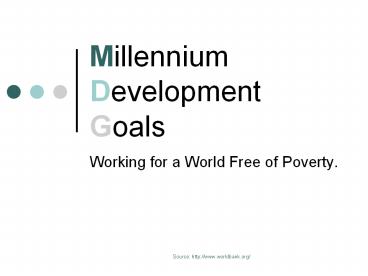Millennium Development Goals - PowerPoint PPT Presentation
Title:
Millennium Development Goals
Description:
Millennium Development Goals Working for a World Free of Poverty. – PowerPoint PPT presentation
Number of Views:891
Avg rating:3.0/5.0
Title: Millennium Development Goals
1
Millennium Development Goals
- Working for a World Free of Poverty.
2
What are the Goals?
- In 2000, 189 countries came together in order to
formulate Millennium Development Goals (MDG). The
achievement of such goals would be significant,
measurable improvements in peoples lives by the
year 2015.
3
The Eight Millennium Development Goals
- Eradicate extreme poverty and hunger
- Achieve universal primary education
- Promote gender equality and empower women
- Reduce child mortality
- Improve maternal health
- Combat HIV/AIDS, malaria, and other diseases
- Ensure environmental sustainability
- Develop a Global Partnership for Development
4
How far have we come in achieving those goals?
And, where to go from here? World Bank Video
The Time is Now
5
In order to measure the success of the MDG, there
are 60 indicators which have 21 time-targeted
measures. A few of those indicators
- Eradicate extreme poverty and hunger
- Halve, between 1990 and 2015, the proportion of
people whose income is less than one dollar a
day. - Achieve full and productive employment and decent
work for all, including women and young people. - Halve, between 1990 and 2015, the proportion of
people who suffer from hunger. - Achieve universal primary education
- Ensure that, by 2015, children everywhere, boys
and girls alike, will be able to complete a full
course of primary schooling. - Promote gender equality and empower women
- Eliminate gender disparity in primary and
secondary education, preferably by 2005, and in
all levels of education no later than 2015. - The Complete List
6
Understanding the MDG Goals
- In the next series of slides, we will get a
better understanding of the first three goals - Eradicating Poverty
- Universal Education
- Gender Equality
7
Proportion of people living on less than 1.25
per day, 1990 2005 (Percentage).
8
Poverty gap ratio at 1.25 per day, 1990 2005
(Percentage).
The poverty gap measures the shortfall in incomes
of people living below the poverty line. While
the international poverty line is set at a level
typical of very poor countries, many people live
on even less than that amount. Economic growth
and improvements in the distribution of income or
consumption reduce the depth of poverty. Since
1990, the depth of poverty has decreased in all
regions except Western Asia. In 2005, the average
income of people living below the poverty line
stood at 0.88. The depth of poverty was greatest
in sub-Saharan African, but has fallen since 1999
to reach the level of Eastern Asia in 1990
9
(No Transcript)
10
Hope dims for universal primary education by
2015, even as many poor countries make tremendous
strides
11
(No Transcript)
12
Universal EducationWorld Bank Video
Health, Equity and Education For All
13
(No Transcript)
14
(No Transcript)
15
(No Transcript)
16
Gender EqualityWorld Bank Video
Gender Equality as Smart Economics
17
Impact of the 2007 2008 Financial Crisis
The bursting of the housing bubble in the United
States in 2007 and subsequent paralysis of the
global financial system became an economic and
labor market crisis that plagued the world
throughout 2009. The cascading crisis crippled
economies, reduced enterprise capacities, and
forced millions of people out of work. Many
resorted to vulnerable forms of employment as the
ranks of the working poor swell.
18
Global Economic Prospects 2010World Bank Video
Global Economic Prospects The Financial Crisis
19
Summary
- Whether we consider
- Eradicating extreme poverty
- Universal education
- Gender equality
- Or, any of the other 5 Millennium Development
Goals, dramatic strides have been made. - However, the road to completing and sustaining
such goals is far from complete.
20
Partnering and The Two Dollar Challenge
- What is a partner?
- A partner helps direct the funds that are raised
during Challenge Week toward the cause of your
choice. - By partnering, youre helping the World Bank to
achieve its eight goals. - You may want to consider the MDG when choosing
your partner and direct the funds you collect
toward partners that focus on those specific
goals. - You can view the full list of goals by following
the link below - The Complete List
- You can view the 2010 progress report on all
eight goals by following the link below - 2010 Progress Report
- 2010 Progress Chart
21
Data and Resources
- All data and resources provided by
- The World Bank
- http//www.worldbank.org/

